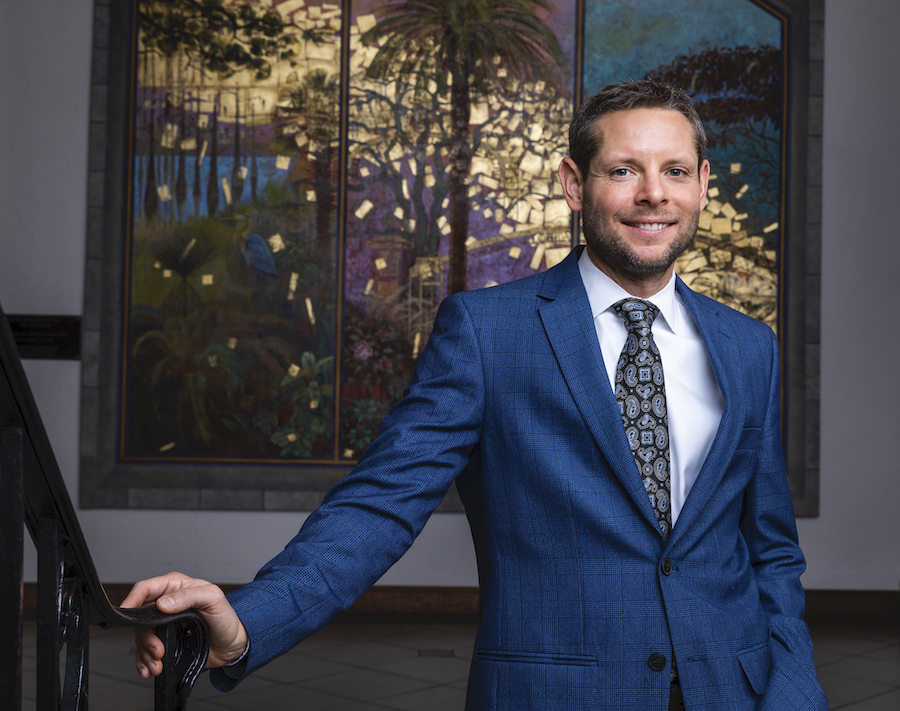The Watchers
Michael McVicar connects the dots between religion and the surveillance state

Sept. 11, 2001 was a pivotal day for many, but for Michael McVicar, associate professor of religion at Florida State University, it was a catalyst for his academic career.
As an undergrad studying political science and history at Ohio State University, McVicar became fascinated with the idea of the surveillance state. He planned to attend graduate school to gain a better understanding of the inner workings of bureaucracies and the ways they track citizens.
But that was before the attacks. Then the terrorist group al-Qaeda coordinated the hijacking of four U.S. airliners, killed nearly 3,000 people, injured more than 6,000 and caused billions in damage. Those actions fundamentally changed McVicar’s questions.
Religious extremism
The aftermath of 9/11 made it impossible for McVicar to ignore religion as a key factor in determining who gets surveilled.
“I doubt I would have linked religion and surveillance the way I do in my current research if not for 9/11,” McVicar said.
In 2002, he started graduate school at Ohio State in comparative studies, an interdisciplinary program that allowed McVicar to tailor his doctoral degree to include religious studies, politics and history. In the wake of the attacks, the classwork exposed him to the study of religious extremism.
McVicar credits his academic adviser for helping him realize religious extremism isn’t necessarily a synonym for terrorism or even violence. It can also mean small groups engaging in behavior the public may find alarming and threatening. That distinction made the question of why some groups are labeled as extremist exceptionally complex.
The “others”
McVicar began examining several domestic religious groups in the U.S. to try to understand their motivations and why Americans fear what he describes as “otherness.”
Some religions, or their subsects, are identified as extremist for violating established cultural norms: Among the articles McVicar has published since arriving at Florida State in 2013 was a study of serpent-handling Christians in the 20th century and how those acts were seen as extreme within the larger Pentecostal movement, which was defined by rituals of speaking in tongues and exorcisms. The American public saw the rituals and practitioners as mysterious through their portrayal in popular culture.
“His vanguard research and highly influential publications are a key part of the current American scholarly investigation of religion and conservatism.”
— John Corrigan, FSU Professor of Religion
“McVicar’s first book, ‘Christian Reconstruction: R.J. Rushdoony and American Religious Conservatism’, was an important contribution to our understanding of the formation of conservative Christian movements most people describe as the ‘religious right,’” said John Kelsay, distinguished research professor of religion at Florida State.
Rushdoony fought for educational reforms and opposed laws prohibiting homeschooling in the 1960s and ’70s, and his position influenced present-day religious and political conservatives. However, his views about reconstructing the government as a Christian state governed by biblical law and using capital punishment against non-believers created a rift between him and mainstream evangelicals that left him in relative obscurity before his death in 2001.
Domestic surveillance
“More recently, Mike’s research is focused on the role of surveillance in American life, for example, in the development of the FBI and other institutions,” Kelsay said.
McVicar is researching America’s historical responses to threats, real and perceived, for the forthcoming book “God’s Watchers: Domestic Intelligence Gathering and Religious Activism from the Civil War to the War on Terror.”
A consistent facet of U.S. intelligence gathering over the last two centuries has been to use religion to identify populations to target for surveillance, McVicar said. Otherness has a consequence in America, as religion plays a key role in national identity and defines who’s in and who’s out.
In the decades following World War II, former FBI Director J. Edgar Hoover believed certain Protestant clergy were susceptible to Communist influence. He regularly encouraged Americans to be watchful while his organization built and maintained meticulous files on suspects, sympathizers and anyone who reported suspicious activity.
Citizen watchdogs
Hoover’s warnings prompted many Christian evangelicals and fundamentalists to report other Protestants to the FBI for allegedly suspicious behavior. Some went so far as making their own lists of suspected Communists and sympathizers. According to McVicar’s research, internal FBI documents from the period indicate nearly all “derogatory information” about communist infiltration came from rival church groups.
While the Red Scare is long over, citizen surveillance is still a part of American society, with much of the “spying” done by neighbors: Consider that for nearly two decades post-9/11, federal, state, and local law enforcement have encouraged the public to report suspicious behavior.
Deep dives
An unintended benefit of this long-term surveillance activity is those records now serve as an academic resource. Thanks to Freedom of Information Act requests, McVicar can see governmental and public viewpoints on religion evolve through what was catalogued over the decades.
“Mike’s careful analyses of key conservative figures, his attentiveness to the enmeshment of religion and politics, and his current study of the central role of religious organizations in the coalescence of the surveillance state are cutting-edge contributions,” said John Corrigan, FSU’s Lucius Moody Bristol Distinguished Professor of Religion.
“His vanguard research and highly influential publications are a key part of the current American scholarly investigation of religion and conservatism.”

